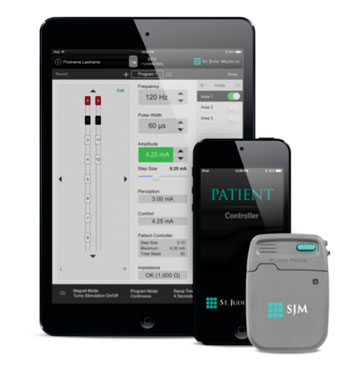Discrete Trial System Helps Evaluate SCS Therapy
By HospiMedica International staff writers
Posted on 10 Aug 2015
A new wireless system is designed to help chronic pain patients better assess their spinal cord stimulation (SCS) therapy prior to the permanent implant. Posted on 10 Aug 2015
The Invisible Trial System evaluates SCS therapy via an entirely wireless experience based on Bluetooth wireless technology, rather than a complex physical controller. The system leverages familiar Apple (Cupertino, CA, USA) technology, using the intuitive iPod touch digital device as a patient controller, while physicians utilize an iPad mini digital device to program and evaluate the patient’s therapy. The iPad mini also displays trial usage data from the external pulse generator (EPG) and allows the physician to print or email the data in PDF format.

Image: The St. Jude Medical Invisible Trial System (Photo courtesy of St. Jude Medical).
A key system features is the use of a small EPG as the system’s power source; since it uses Bluetooth to communicate between the patient’s iPod touch controller and the stimulation system, the system can be worn discreetly under a patient’s clothing. As such, the system feels essentially “invisible” to the wearer, providing a more comfortable trial experience that allows patients to focus entirely on the system’s therapeutic impact during their trial. The Invisible Trial System is a product of St. Jude Medical (SJM; St. Paul, MN, USA), and has been approved by the US Food and Drug Administration (FDA).
“When we developed the new Invisible Trial System, we took into account physician and patient feedback that current trial systems were in some cases preventing patients from adequately assessing their therapy,” said Eric S. Fain, MD, group president of SJM. “By providing a more patient-friendly option, we think we can shorten the learning curve related to trial programming devices and allow patients to better assess the potential pain relief they’re receiving from spinal cord stimulation.”
“Patients undergoing SCS trials consistently tell us about challenges they find in navigating the SCS trial system, from programming the device, to discomfort from the programming cables, to management of both issues,” said pain specialist Jason Pope, MD, president of Summit Pain Alliance (Santa Rosa, CA, USA). “By providing a discreet trial system, St. Jude Medical will help patients focus more on their potential pain relief and functional improvements, and less about the burdens common to traditional trial systems.”
Related Links:
St. Jude Medical
Apple














